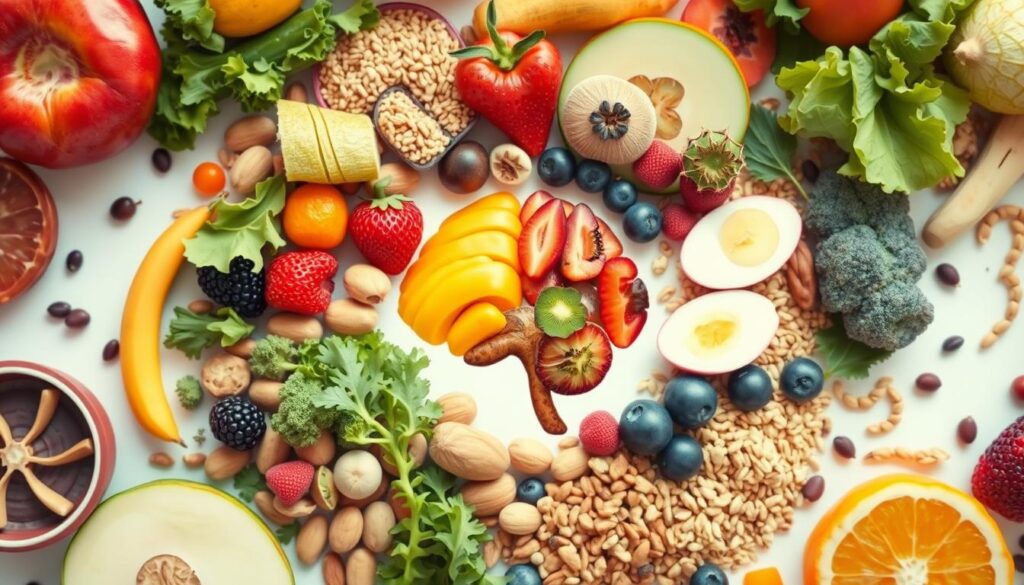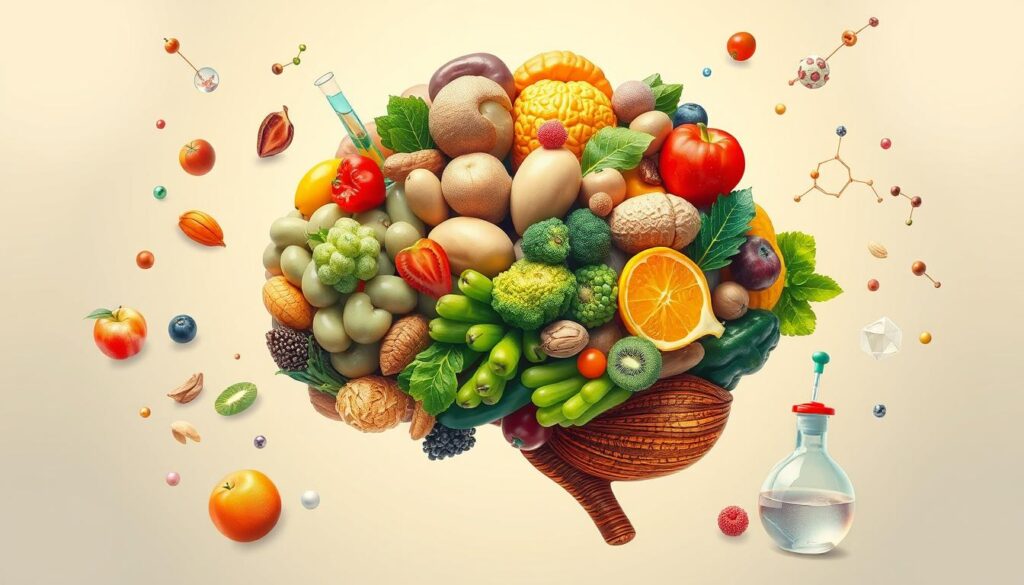Could the food on your plate be the secret weapon for conquering mental health challenges? Modern research shows a strong link between what we eat and how we feel. Our diet choices deeply affect our mental health.
The American Society for Nutrition says our diet impacts brain function and mood. Nutrition and mood are closely connected in our mental health journey.
Studies show that our diet can greatly affect our mood. The brain needs certain nutrients to work well. What we eat can either help or hurt our mental health.
Key Takeaways
- Diet directly impacts brain function and mental health
- Nutrient-rich foods can help manage mood and reduce depression risks
- Healthy eating is a powerful tool for mental wellness
- Nutrition plays a critical role in cognitive performance
- Mindful food choices can improve overall psychological resilience
Understanding the Connection Between Diet and Mental Well-being
The link between what we eat and our mental health is strong. Studies show that our food choices affect our mood and overall well-being.
Experts now see how a balanced diet helps manage anxiety. The way we eat affects how we feel, leading to better mental health.
The Bidirectional Relationship of Food and Mental Health
Our diet affects our mental health in several ways:
- It controls brain chemistry and neurotransmitters.
- It keeps our gut microbiome healthy.
- It lowers inflammation.
- It keeps blood sugar stable.
Latest Research Findings on Nutrition’s Impact on Mental Health
Recent studies show a clear link between whole foods and mental health. A big research project found a strong connection between what we eat and how we feel.
“Your food choices directly impact your mental health, creating a powerful connection between nutrition and emotional resilience.”
Statistics on Public Awareness and Willingness to Change
More people are learning about the diet-mental health connection. Surveys show that many are now aware of how food affects their mind.
| Awareness Category | Percentage |
|---|---|
| Adults understanding diet-mental health link | 66% |
| Individuals willing to modify diet for mental health | 81% |
| People recognizing nutrition’s psychological impact | 74% |
Knowing this connection helps us make better food choices. It supports both our physical and mental health.
The Science Behind Healthy Eating and Mental Health
Nutrition science shows a strong link between what we eat and our mental health. Eating plant-based meals can help our minds stay clear. Studies show that our diet affects how our brain works and how we feel.
Our brain needs certain nutrients to work well. Foods that fight inflammation are good for our brain. Eating foods rich in nutrients can help us feel better and think clearer.
“Food is not just fuel, but information that speaks to our genes, instructing them to express health or disease.” – Dr. Mark Hyman
- Brain consumes 90% of energy from carbohydrates
- Nutrient deficiencies can impact neurotransmitter production
- Specific nutrients directly influence mood regulation
Science proves that nutrition is key to our mental health. Not getting enough nutrients like tyrosine or tryptophan can mess with our mood.
| Nutrient | Brain Function Impact |
|---|---|
| Omega-3 Fatty Acids | Reduces inflammation, supports neural connectivity |
| Vitamin D | Regulates mood, prevents seasonal affective disorder |
| Magnesium | Supports stress response, improves sleep quality |
Eating foods rich in nutrients can boost our mental health. The study of nutrition and mental health is growing. It’s exciting to see how diet affects our mood and brain function.
Essential Nutrients That Support Mental Health
Nutrition is key to mental health and emotional balance. What we eat affects how we feel deeply. A balanced diet boosts mood, brain function, and mental well-being.
Our brain needs specific nutrients to work well. The link between food and mood is complex but vital for mental health.
Role of Vitamins and Minerals in Brain Function
Some vitamins and minerals are vital for brain health and mood:
- Vitamin D supports neurotransmitter production
- B-complex vitamins help reduce stress and anxiety
- Magnesium aids in regulating neurotransmitters
- Zinc plays a role in brain plasticity
Importance of Healthy Fats for Mental Well-being
Healthy fats are key for brain health and mood. Omega-3 fatty acids, found in fish, nuts, and seeds, are vital for emotional stability.
“The food you eat can be either the safest and most powerful form of medicine or the slowest form of poison.” – Ann Wigmore
Protein and Amino Acids for Mood Regulation
| Protein Source | Key Amino Acids | Mental Health Benefits |
|---|---|---|
| Lean Meats | Tryptophan | Supports serotonin production |
| Eggs | Tyrosine | Helps manage stress |
| Legumes | Glutamine | Reduces anxiety |
Proteins have amino acids essential for making neurotransmitters. Eating a variety of proteins helps support mental health.
Mediterranean Diet and Depression: Clinical Evidence
Recent studies have found a strong link between diet and depression. They show that the Mediterranean diet can greatly help with mental health. A 2022 study found that whole foods can make a big difference in how we feel.
The study looked at 60 people over 12 weeks. It tested how the Mediterranean diet affects depression. The results were very encouraging, showing that diet can help manage depression.
“Nutrition plays a critical role in mental health, and diet can be a promising way to fight depression.” – Research Team
Study Highlights
- Total participants: 60 individuals
- Intervention group: 30 participants
- Control group: 30 participants
- Assessment method: DASS-21 questionnaire
The Mediterranean diet is full of good stuff for our minds. It includes:
- Extra virgin olive oil
- Fresh vegetables and fruits
- Seeds and legumes
- Moderate meat and dairy intake
The study found amazing results. People who followed the Mediterranean diet saw a big drop in depression scores. This shows that eating well can really help our mental health.
| Dietary Intervention | Depression Score Reduction |
|---|---|
| Mediterranean Diet Group | 20.6 points |
| Control Group | 6.2 points |
This research gives us hope. It shows that changing our diet can help fight depression.
Building a Mental Health-Friendly Meal Plan
Making a meal plan for emotional health needs careful thought and mindful eating. What we eat affects our stress levels and mental health. Knowing our daily nutritional needs and using smart eating tips can help manage our mental health.
Daily Nutritional Requirements
A balanced diet is key for emotional stability and stress relief. The amount of food we need changes based on our gender:
| Food Group | Women | Men |
|---|---|---|
| Grains | 6-8 ounces | 8-10 ounces |
| Protein | 5-6.5 ounces | 6.5-7 ounces |
| Dairy | 3 cups | 3 cups |
| Fruits/Vegetables | 4-5 cups | 5-5.5 cups |
Meal Timing and Frequency
Regular meals help keep blood sugar stable and support mental health. Here are some mindful eating tips:
- Eat balanced meals every 3-4 hours
- Avoid skipping breakfast
- Plan snacks that combine protein and complex carbohydrates
Portion Control Guidelines
“Small, intentional changes in eating habits can lead to significant improvements in mental well-being.”
Controlling portions helps manage stress and boosts emotional stability. Use smaller plates, measure servings, and eat slowly to enhance mindful eating practices. Key strategies include:
- Pre-portion snacks in individual containers
- Use hand measurements as portion guides
- Listen to hunger and fullness cues
By following these nutritional tips, we can make a meal plan that supports our physical and mental health. This can reduce stress and improve our emotional well-being.
The Impact of Hydration on Mental Clarity
Water is key to our mental health and emotional balance. It connects our nutrition and mood. Studies show a strong link between drinking water and how well our brains work.
“Hydration is not just about quenching thirst—it’s about nourishing your brain and supporting mental clarity.” – Nutrition Expert
Knowing how much water our brains need changes how we eat and feel. Research shows water’s big role in our mental performance:
- Drinking 5+ glasses of water daily reduces depression risk
- Proper hydration enhances cognitive flexibility
- Water intake improves short-term memory and attention
Hydration does more than just stop us from feeling thirsty. Families can boost their mental health by drinking more water and learning about its brain benefits.
| Water Intake | Mental Health Benefit |
|---|---|
| 2-3 cups daily | Limited cognitive function |
| 5-6 cups daily | Improved mood and memory |
| 10+ cups daily | Enhanced mental clarity |
Pro tip: Add water-rich fruits and veggies to your diet. Try to get 20% of your water from these foods.
Not drinking enough water can make us feel moody, less focused, and more anxious. Drinking enough water helps our brain work better and keeps us emotionally stable.
Gut Health and Its Connection to Mental Well-being
The link between gut health and mental health is a new area of study. Our digestive system does more than just digest food. It talks to our brain, affecting our mood and mind.
Research shows that the gut microbiome affects our mental state. Trillions of microbes in our gut can change our mood and how we think.
Probiotics: Nature’s Mental Health Allies
Probiotics are key for a healthy gut and mind. Studies say they can help with anxiety and depression. What we eat can greatly affect our mental health, thanks to probiotics.
- Yogurt
- Kimchi
- Pickles
- Kombucha
Anti-inflammatory Foods for Brain Health
Anti-inflammatory foods are vital for brain health. They fight inflammation, protecting our brain and keeping it working well.
| Anti-inflammatory Food | Brain Health Benefits |
|---|---|
| Fatty Fish | Omega-3 fatty acids support neural communication |
| Berries | Antioxidants reduce neurological inflammation |
| Leafy Greens | Rich in nutrients that support cognitive function |
“The gut is not just a digestive organ, but a complex ecosystem that directly influences our mental state.” – Neurogastroenterology Research
To keep our gut healthy, we need to do more than just eat right. We should also exercise, manage stress, get enough sleep, and eat a variety of foods. This helps our gut and mind stay in balance.
Social Aspects of Healthy Eating
Sharing meals is more than just eating. It’s a way to connect with others and feel emotionally stable. Studies show that eating together can really boost our mental health.
“Food is not just fuel, but a social experience that nourishes both body and soul.”
Mindful eating and stress reduction come from eating together. Making meals a social event changes how we see food and our emotional health.
- Set aside at least one day weekly for family or group meals
- Involve everyone in meal preparation and cleanup
- Minimize digital distractions during meals
- Practice active listening and engaging conversations
Eating together has big psychological benefits. People who eat with others often feel:
- More connected
- Less lonely
- Emotionally closer
- Better at talking
Food and emotional health are closely tied through social eating. Turning meals into chances to connect helps build stronger relationships and supports mental health.
Studies show that eating together regularly can lower stress, improve digestion, and support overall well-being. The simple act of eating together becomes a powerful tool for mental and emotional resilience.
Foods to Avoid for Better Mental Health
Nutrition and mood are closely linked. Some foods can harm our mental health, making depression worse. Knowing which foods to avoid helps us eat better.
Here are some foods that can harm our mental health and should be eaten less or not at all:
- Sugary drinks and sodas
- Processed meats
- Refined carbohydrates
- High-fat dairy products
- Deep-fried foods
Impact of Caffeine and Stimulants
Caffeine has a tricky relationship with our mental health. While a little might help, too much can cause anxiety and mess up our sleep. Energy drinks are even worse because they have lots of caffeine and sugar.
“Moderation is key when consuming caffeinated beverages for mental wellness.”
Understanding Trans Fats and Processed Foods
Processed foods often have trans fats and artificial stuff that can hurt our mood and mental health. These foods can cause inflammation and mess with our hormones.
| Food Category | Mental Health Impact |
|---|---|
| Refined Sugars | Increased anxiety and mood swings |
| Trans Fats | Potential depression risk |
| Artificial Sweeteners | Linked to increased depression symptoms |
To boost mental health through food, focus on whole foods. Cut down on processed stuff and aim for a balanced diet full of good nutrients.
Conclusion
Healthy eating and mental health are closely linked. A balanced diet can greatly improve emotional stability and brain function. This shows how important it is to make smart food choices for our mental health.
Studies show that diets like the Mediterranean can lower depression risk by up to 33%. Our brains need 20% of our daily calories, making good nutrition key. Experts suggest eating whole foods, lean proteins, and nutrient-rich foods to boost mental health.
Making small changes in our diet can lead to big mental health gains. Cutting down on processed foods and eating more fruits, veggies, and healthy fats is a good start. Getting help from a nutritionist can also be very helpful.
Diet is a big part of mental health, helping with stress and emotional balance. By focusing on nutrition, we can improve our mental health and overall life quality.
FAQ
How does diet directly impact mental health?
Diet and mental health are closely linked. Eating whole foods can help reduce inflammation and change how our brain chemicals work. This can help lower symptoms of depression and anxiety.
What diet is most recommended for improving mental health?
The Mediterranean diet is great for mental health. It’s full of fruits, veggies, whole grains, nuts, seeds, and healthy fats. Studies show it can really help with depression.
How many fruits and vegetables should I eat to support mental health?
Women should aim for 4-5 cups of fruits and veggies daily, while men should aim for 5-5.5 cups. Eating more of these can boost your mood and reduce depression.
Can hydration affect my mental well-being?
Yes, drinking enough water is key for clear thinking and emotional balance. Even a little dehydration can make you feel bad. Drinking enough water helps your mind stay sharp.
What role does gut health play in mental health?
Gut health is very important for our mental state. Foods with probiotics, like yogurt, can help our gut. Eating foods that fight inflammation, like fruits and omega-3 fish, can also help our brain.
Are there foods I should avoid for better mental health?
Try to limit caffeine to 4 cups of coffee a day. It can make you anxious and mess with your sleep. Also, avoid foods with trans fats and lots of sugar, as they can mess with your mood.
How important are social aspects of eating for mental health?
Eating with others is very good for your mind. It gives you structure, connects you with others, and helps you eat mindfully. Try to have a meal with others at least once a week.
What nutrients are most important for mental health?
Vitamins and minerals are key for brain health. Healthy fats from foods like olive oil and fish are also important. Plus, proteins with amino acids help regulate your mood. Eating a balanced diet is essential for good mental health.
How quickly can dietary changes impact mental health?
Studies show you can see improvements in just 12 weeks. A study on the Mediterranean diet found big drops in depression symptoms in 12 weeks. This shows that changing your diet can quickly help your mental health.
How willing are people to change their diet for mental health?
A 2023 poll by the American Psychiatric Association found 81% of adults are open to changing their diet for better mental health. Also, 66% know how diet affects their mind.






